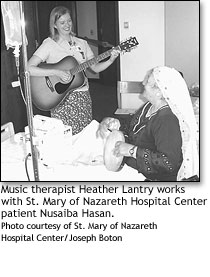|
|
‘Lord, make me an
instrument of your ...
music’?
Tuneful therapy finds a hospital home
By Carmelita Banks
Correspondent
Music, it’s said, has the power to “soothe the savage breast.” It also has the power to heal.
St. Mary of Nazareth Hospital is putting into practice the sense that music therapy is not a whim, but a valid clinical experience with medical results like improved ability to fight disease, decreased hospital stays, and developing skills to deal with pain or stress.
Music therapy is a powerful, noninvasive medium “to address physical, psychological, cognitive or social functioning for patients of all ages ... and disabilities,” according to the American Music Therapy Association. It was first used to assist recovery in the United States after the World War I and II.
Heather Lantry has seen that power up close. “A day rarely goes by that I don’t stop in the chapel and ask God to use me as an instrument for healing,” she said.
The program began at St. Mary’s in January as a pilot. After the hospital’s Holy Family Sister Antonia Klausner and Dr. Elisabeth Jacobi of the Music Medicine Institute secured one-year foundation grants, Lantry, a full-time music therapist, came on board in April.
Most days find Lantry at the bedside of patients referred to her by other hospital staff. She quickly assesses patient needs, tailors music therapy to their treatment goals and evaluates their progress. For example, a cancer patient needed distraction from pain. Once Lantry identified what kind of music she’d recently enjoyed, the woman received a stack of reggae CDs.
Musical distraction works because “we’re only allowed to focus on so many stimuli at a time, ” Lantry said. Some childbirth patients find distraction helpful; others want music therapy that makes them fully aware of the birth process. Lantry uses both live and recorded music as she makes her rounds, but some research studies indicate that live is more effective.
Three days a week Lantry targets common human experiences with psychiatric and occupational therapy groups. Her focus is decreased isolation through self-expression and emotional support. For example, after one patient offers a complaint, the group becomes comfortable improvising a 12-bar blues song, revealing feelings “right there, raw, that they could never do just talking.”
As a Danville teenager, Lantry wasn’t sure what she wanted to be. From a musical family, the bassoonist spent most of her time in music classes, but she “was torn between psychology, music, accounting and chemistry,” she said.
The music therapy program at Illinois State University covered most of the bases. The first two years, similar to that of most music majors, required proficiency with keyboard, guitar and voice. Lantry also has at least a beginner’s knowledge of other instruments. Her musical tastes range from classical to rhythm and blues.
The last two years at ISU left her “a class or two short of a psychology minor,” she said. In addition to taking several physiology courses, she had three semester-long practicums on campus in clinical training and a six-month internship at Arizona State Hospital.
After acquiring a bachelor’s degree and passing her medical boards, Lantry worked in the Institute for Therapy through the Arts program, traveling for three years to area schools, group homes and nursing homes. She also serviced some of the Music Institute of Chicago’s six sites.
“My youngest client was 2; my oldest, 86,” she said. Some had had strokes, some psychological or behavioral problems, and some were born with handicaps like autism, she said.
Lantry wants music therapy to become “established ... in a variety of settings,” not just a hospital. Although many positions in Illinois are contractual or piecemeal, most are full-time in California and on the East coast, she said.
Front Page | Digest | Cardinal | Interview
Classifieds | About Us | Write Us | Subscribe | Advertise
Archive | Catholic Sites | New World Publications | Católico | Directory | Site Map
|






